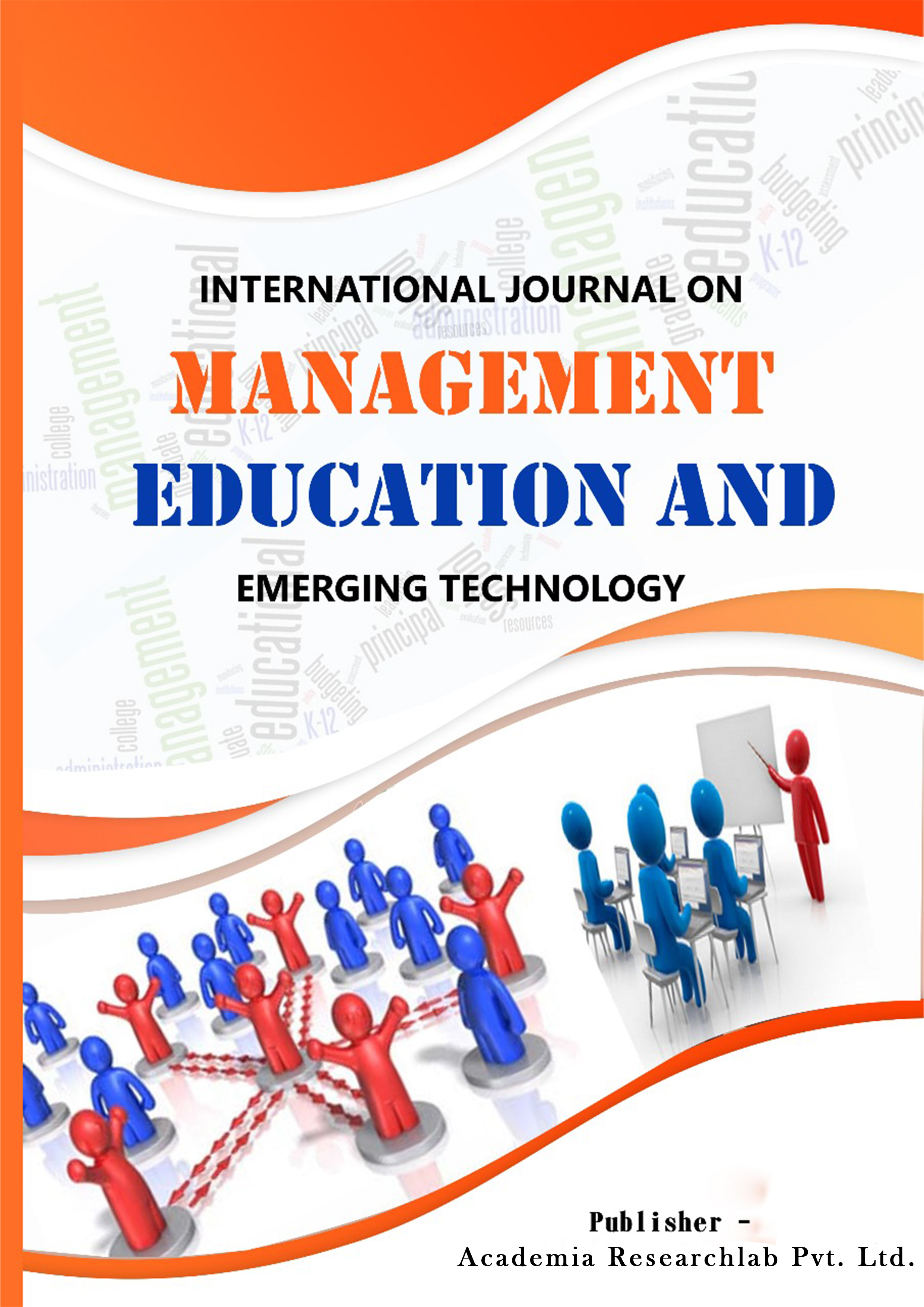A Case Study About Self-Interest Over Social Responsibility Of An Individual: The Context Of Ethical Egoism Among Data Hackers
Keywords:
Cybersecurity, Motivation, Ethical hacking, Hacker types, Hacker communitiesAbstract
This study aimed to understand the common misconception that data hackers are solely concerned with their self-interest and determine whether they put self-interest ahead of societal duty. Interviews and observations were utilized in two Discord communities focusing on White hat hackers to identify the motivation of the data hackers. Based on the outcome of the study, social responsibility is typical in white hat hackers. It also showed that ethical hacker members did not tolerate unethical behavior inside the Discord communities. The study also highlights a different kind of motivation including personal interest, creativity, and a social responsibility to online security. The results showed that data hackers are not only motivated by their self-interest; this study illustrates that a substantial number of hackers are motivated by social responsibility, especially white hat hackers.
References
Akre, A., Komrelliwar,O. (2023). View of impact of social responsibility in today’s youth. https://journal.hmjournals.com/index.php/JSRTH/article/view/2095/2159?fbclid=IwAR3Mhx8cIPzB S3e9IjvTeC-1Nx7onhqJ76TlVnhfFb6RBdWK3g1Lh02Roio Bada, M. (2019, January 9). Cyber Security Awareness Campaigns: Why do they fail to change behaviour?. arXiv.org. https://arxiv.org/abs/1901.02672
Barqué-Duran, A., Pothos, E. M., Hampton, J. A., & Yearsley, J. M. (2017). Contemporary morality: Moral judgments in digital contexts. Computers in Human Behavior, 75, 184–193. https://doi.org/10.1016/j.chb.2017.05.020
Cayubit, R.F.O., Rebolledo, K.M., Kintanar, R.G.A. et al. (2017). A Cyber Phenomenon: A Q-Analysis on the Motivation of Computer Hackers. Psychol Stud. doi: https://doi.org/10.1007/s12646-017-0423-9. https://www.academia.edu/87753408/A_Cyber_Phenomenon_A_Q_Analysis_on_the_Motivation_of
_Computer_Hackers?sm=b Charles, Z. (2022). Cyber Security and Philosophy: An Intersection. Retrieved from https://inds.uccs.edu/sites/g/files/kjihxj2421/files/2022-06/Philosophy-Charles-Final-Paper.pdf.
Chng, S., Lü, H., Kumar, A., & Yau, D. K. Y. (2022). Hacker types, motivations and strategies: A comprehensive framework. Computers in Human Behavior Reports, 5, 100167. https://doi.org/10.1016/j.chbr.2022.100167
Crocker, J., Canevello, A., Brown, A. (2017). Social Motivation: Costs and Benefits of Selfishness and Otherishness. Annual Review of Psychology, 68, 299-325. https://doi.org/10.1146/annurev-psych- 010416-044145
Curtis, J., & Oxburgh, G. (2023). Understanding cybercrime in ‘real world’ policing and law enforcement. The Police Journal, 96(4), 573-592. https://doi.org/10.1177/0032258X221107584
Cybercrime Prevention Act of 2012 (2012). https://lawphil.net/statutes/repacts/ra2012/ra_10175_2012.html Data Privacy Act of 2012 (2012). https://lawphil.net/statutes/repacts/ra2012/ra_10173_2012.html
Department of Justice (2017). OOC REPORT FINAL. Retrieved from https://doj.gov.ph/files/OOC/OOC%20REPORT%20FINAL.pdf
Dhirani, L. L., Mukhtiar, N., Chowdhry, B. S., & Newe, T. (2023). Ethical Dilemmas and Privacy Issues in Emerging Technologies: A review. Sensors, 23(3), 1151. https://doi.org/10.3390/s23031151
Filiol, É., Mercaldo, F., & Santone, A. (2021). A method for automatic penetration testing and mitigation: a red hat approach. Procedia Computer Science, 192, 2039–2046. https://doi.org/10.1016/j.procs.2021.08.210.
Hammouchi, H., Chergi, O., Mezzour, G., Ghogho, M., El Koutbi, M. (2019). Digging Deeper into Data Breaches: An Exploratory Data Analysis of Hacking Breaches Over Time. Procedia Computer Science, 151, 1004–1009. https://doi.org/10.1016/j.procs.2019.04.141
Hassan, P. (2019). Virtue & The Problem of Egoism in Schopenhauer’s Moral Philosophy. Retrieved from https://philpapers.org/archive/HASVAT.pdf
Ho, B. (2017). A Defense of Egoism. Retrieved from https://philpapers.org/archive/BACADO-2.pdf. International Telecommunication Union — Statistics. (2023). Statistics (itu.int)
ISO - ISO 26000 — Social responsibility. (2021, October 15). ISO. https://www.iso.org/iso-26000- social-responsibility.html
Japan - Octopus Cybercrime Community - www.coe.int. (n.d.). Octopus Cybercrime Community. https://www.coe.int/en/web/octopus/-/japan_legislation
Jaquet-Chiffelle, D. 0., & Loi, M. (2020). Ethical and Unethical Hacking. Chapter 9. https://doi.org/10.1007/978-3-030-29053-5_9
Kodapanakkal, R. I., Brandt, M. J., Kogler, C., & van Beest, I. (2020). The impact of online hate speech on social media: A systematic review. Computers in Human Behavior, 107, 106303. https://doi.org/10.1016/j.chb.2020.106303
MSEd, K. C. (2024b, January 18). What is a case study? Verywell Mind. https://www.verywellmind.com/how- to-write-a-psychology-case-study-2795722
NACDL - Computer Fraud and Abuse Act (CFAA). (n.d.). NACDL - National Association of Criminal Defense Lawyers. https://www.nacdl.org/Landing/ComputerFraudandAbuseAct
Nasr, E. (2018). An analytical approach to psychological behavior of hackers’ motives. Academia. https://www.academia.edu/27358059/An_Analytical_Approach_to_Psychological_Behavior_of_Hac kers_Motives Nobis, N. (2019). 1000-Word PHILOSOPHY An Introductory Anthology. Retrieved from https://philpapers.org/archive/NOBEE.pdf
Prasad, S. T. (2014). Ethical Hacking and Types of Hackers. Retrieved from https://www.ijetcse.com/admin/uploads/Ethical%20Hacking%20and%20Types%20of%20Hackers_16 05787993.pdf
Quinn, M. (2020). Ethics for the information age (8th ed.). Pearson
Owen, K. (2016). Motivation and Demotivation of Hacker Activities – A Contextual Approach.
Owen_Kenneth_D_201604_PhD -Business-Admin.pdf (mcmaster.ca)
Sahare, B., Naik, A., & Khandey, S. (2014). Study of ethical hacking. Int. J. Comput. Sci. Trends Technol, 2(4), 6-10.
Sinha, S., & Arora, Y. (2020). Ethical Hacking:The story of a white hat hacker. Social Science Research Network. https://doi.org/10.2139/ssrn.3670801
Votipka, D., Stevens, R., Redmiles, E., Hu, J., and Mazurek, M. (2018). Hackers vs. Testers: A Comparison of Software Vulnerability Discovery Processes. 2018 IEEE Symposium on Security and Privacy (SP), San Francisco, CA, USA, (pp. 374-391). Institute of Electrical and Electronics Engineers. doi: 10.1109/SP.2018.00003. https://ieeexplore.ieee.org/abstract/document/8418614
Additional Files
Published
How to Cite
Issue
Section
License
Copyright (c) 2024 International Journal on Management Education and Emerging Technology(IJMEET)

This work is licensed under a Creative Commons Attribution-NonCommercial-NoDerivatives 4.0 International License.





